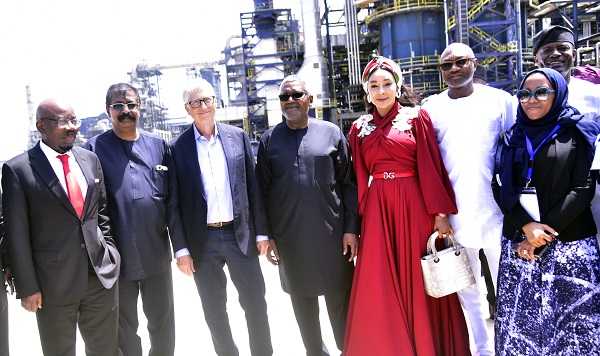Founder/Chairman Zenith Bank PLC, Jim Ovia; Vice President, Oil & Gas, Dangote Industries Ltd (DIL), Devakumar Edwin; Microsoft founder, Bill Gates; President Dangote Industries Limited, Aliko Dangote; Group Managing Director/CEO Zenith Bank, Dr Adaora Umeoji; Chairman, Geregu Power PLC, Femi Otedola; Group Executive Director Commercial Operations, DIL, Fatima Aliko Dangote and Group Managing Director/CEO Nigerian Exchange Group, Temi Popoola, during a recent visit to the Dangote Petroleum Refinery & Petrochemicals, Ibeju Lekki.
A recent initiative by the Dangote Petroleum Refinery, involving the distribution of Premium Motor Spirit (PMS), diesel and other petroleum products to marketers, petrol station operators, manufacturers, telecommunications companies, the aviation sector, and other large-scale users, with free logistics support, has been hailed by experts as a move with the potential to reduce inflation, create thousands of jobs, and lower the cost of petroleum products across Nigeria.
Crucially, the refinery’s plan to deploy 4,000 new Compressed Natural Gas (CNG)-powered tankers is expected to not only address the country’s long-standing distribution inefficiencies but also reduce the influence of intermediaries and contribute to environmental sustainability.
Dr Abimbola Oyarinu, a university lecturer and public affairs analyst, stated that if successfully implemented, the policy could significantly reduce the power held by middlemen within the oil and gas distribution chain. He observed that these intermediaries, including tanker drivers, have historically held the sector, and sometimes even the state, to ransom.
“This initiative has the potential to dismantle the dominance of powerful middlemen, who have in the past stalled progress and held entities like the NNPCL hostage,” said Oyarinu. “However, Nigerians will judge it by its impact on fuel prices. If it leads to cheaper petrol at the pump, it will ease inflation considering fuel costs and exchange rates are key inflationary drivers in Nigeria.”
Ibukun Phillips, an energy analyst, described the move as “revolutionary”, stating that it could reshape Nigeria’s energy landscape by improving accessibility and affordability, especially in rural areas.
“Logistics currently account for between 10% and 30% of fuel prices,” she explained. “Eliminating this cost will naturally reduce pump prices. Rural dwellers often pay more for fuel than those in urban areas, despite earning less. This initiative could revive disused filling stations and ensure more equitable distribution.”
Phillips added that the scheme will also generate employment, with at least 8,000 drivers expected to be hired to kickstart the operation.
Speaking on a national television programme, energy expert and co-founder of Dairy Hills, Kelvin Emmanuel, said Dangote’s move to cover logistics costs marks a critical shift that could allow Nigerians to finally benefit from domestic refining. He argued that concerns about the refinery becoming a monopoly are misplaced, pointing instead to systemic inefficiencies that have plagued the sector for decades.
“People have valid concerns,” Emmanuel acknowledged. “But let’s be clear: the real business marketers have been involved in isn’t selling PMS with margins of N5 to N15. Their real gains have come from exploiting arbitrage opportunities, often with substandard imports that don’t meet the sulphur specifications outlined in the Petroleum Industry Act (PIA).”
He highlighted how logistical and regulatory failings have hampered fuel distribution.
“For instance, I can confirm that the Nigerian Midstream and Downstream Petroleum Regulatory Authority (NMDPRA) currently owes independent marketers N1.8 billion in outstanding bridging claims. Whether these claims are valid is another matter—an independent forensic audit would be required to determine that.”
According to Emmanuel, the Dangote Refinery is stepping in to address long-standing gaps in Nigeria’s fuel distribution system. He emphasised that fuel supply across the country remains inconsistent, with only Lagos, a few states in the southwest, and Abuja enjoying relatively stable and fair pump prices
“Dangote is taking on the burden of transportation, storage, and bridging costs that should have been streamlined long ago. This is in response to the resistance from vested interests who have tried to frustrate fair and efficient distribution,” he said.
He further explained that the refinery’s current reliance on road transport is a strategic move to bypass infrastructural and bureaucratic bottlenecks.
“The immediate fix is the deployment of CNG-powered trucks to ensure last-mile delivery while avoiding delays caused by existing structural inefficiencies,” Emmanuel added.


Comment here